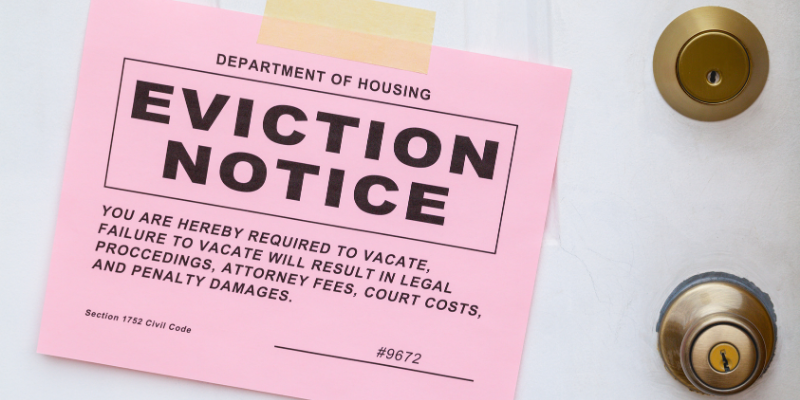
You own a rental property in Fort Worth, but your tenant hasn’t paid rent in three months. Most evictions take about three to six weeks, but delays are common. Here’s what you need to know about how long the eviction process takes in Fort Worth, TX.
What Is the Texas Eviction Process?
Texas calls evictions “forcible entry and detainer” suits, which sounds way more dramatic than it is.
The state designed this process to balance landlord rights with tenant protections. You can’t just change the locks and throw someone’s stuff on the curb like they do in the movies.
Texas law requires you to follow specific steps in a particular order. If you miss a step, the court will toss your case.
The process starts with a written notice and ends with the constable physically removing the tenant. Everything in between involves paperwork, court dates, and waiting periods that can feel endless when you’re not collecting rent, unless you work with Southern Hills Home Buyers, which can help you navigate it all or offer a cash solution to move on faster.
Types of Written Notice in Texas
Before filing an eviction lawsuit, you must give your tenant proper written notice.
Texas has several types of notices. If you choose the wrong one, your entire case will be delayed.

- Three-day notice to vacate: This is used for non-payment of rent or lease violations. It gives tenants three days to pay up, fix the problem, or get out. This is your notice for most situations.
- 30-day notice: This is required for month-to-month tenancies when you want to terminate without cause. You can’t just decide you want your rental back and give three days’ notice. These tenants have more protection.
- Immediate notice: Now, this is reserved for serious stuff like illegal drug activity or threats of violence. Tenants cannot fix anything in these situations because some problems can’t be fixed.
- Custom notice periods: Some leases specify different timeframes. If your lease says tenants get five days to deal with rent problems, you must give them five days. Ignoring your contract terms, you can’t speed up how long an eviction process takes in Fort Worth, TX.
The notice must be in writing and delivered correctly. Texting your tenant about being late on rent isn’t a legal notice under Texas law.
Yes, you need actual paperwork that follows specific formatting requirements. It should be delivered through personal service, certified mail, or posted inside the main entry door.
Pro Tip: Serve notice on a Friday, and the three days don’t start until Monday because weekends and holidays don’t count toward notice periods.
Filing the Eviction Suit in Fort Worth
Once your notice period expires and the tenant hasn’t complied, you can file your eviction lawsuit in Justice Court.
Fort Worth is in Tarrant County, with multiple Justice Court precincts handling these cases.
Justice Court Requirements in Tarrant County
You must file your eviction suit in the Justice Court precinct where your rental property sits. If you get this wrong, the court will dismiss your case before you start.
Tarrant County has eight Justice Court precincts, each covering different areas of Fort Worth and surrounding cities. That’s why it might be confusing for landlords.
Justice Court 1 covers much of central Fort Worth and handles many eviction cases. The clerks there have seen every type of landlord mistake you can make, like backwards paperwork and completely missing documents.
They won’t give you legal advice, but they’ll tell you if your paperwork lacks required information so you don’t waste time and money.
Required Documentation for the Eviction Suit
Your eviction petition needs specific information to be valid under Texas law. You must include the tenant’s name, property address, reason for eviction, and amount of unpaid rent.
Also, attach copies of your lease agreement, the notice you served, and proof that you delivered it properly. Missing any of these documents can extend how long the eviction process will take in Fort Worth, TX.
The petition form asks for a sworn statement about your case. Just give the facts here because judges have heard every sob story you can think of. Stick to what you can prove with documents.
If you claim the tenant owes three months’ rent but can only prove two months, you won’t appear very credible to the judge.
Filing Fees and Service of Process
Filing fees in Tarrant County run about $54 for the eviction petition. You’ll also pay around $75 for the constable to serve your tenant with the lawsuit papers.
If you win, these costs can be intimidating when you’re already missing rent payments, but you can ask the court to include them in your judgment.
The constable has to serve your tenant at least six days before the court hearing. They’ll try to hand-deliver the papers to your tenant or another adult at the property.
If nobody answers after two attempts, the constable can post the papers on the door and mail copies. This service requirement is another factor in the length of time an eviction process takes in Fort Worth, TX.
Eviction Timeline in Fort Worth, TX: Step-by-Step Breakdown
How long does the eviction process take in Fort Worth, TX? Here’s the realistic timeline.
Spoiler alert: Things rarely go according to plan.
Step 1: Written Notice to Vacate (3 to 30 Days)
Your notice period depends on what type of violation you’re dealing with. Rent problems usually get a three-day notice, but month-to-month tenancies need 30 days if you terminate without cause.
The process starts from the day you properly serve the notice, not when you write it.
Don’t count weekends or holidays in your notice period because Texas law doesn’t count them either. Serve a three-day notice on Friday, which doesn’t expire until Wednesday.
Also, make sure you’re serving the notice correctly. Post it outside the door; only if you can’t get inside can you put it inside the main entry door.
Step 2: Filing the Eviction Lawsuit (8 to 10 Days After Notice Period)
Once your notice period expires, you can file your eviction suit immediately. Most landlords wait a day or two to make sure the tenant isn’t going to comply.
The court will schedule your hearing between 10 and 21 days after you file, depending on how backed up they are.
Court scheduling depends on how busy your Justice Court precinct is and what time of year you’re filing. Justice Court 1 in Fort Worth stays pretty backed up, so you might wait closer to three weeks for your hearing date.
Summer months are busier because most leases expire and people move around.
Step 3: Court Hearing and Judgment (10 to 21 Days After Filing)
Your hearing will probably last less than 10 minutes if you have proper documentation and the tenant doesn’t show up with a sob story.
Make sure that you bring originals of everything. You should also be ready to answer basic questions about your lease and the tenant’s violations. Don’t expect drama like you see on TV.
If you win, the judge will issue a judgment giving the tenant five days to vacate. If the tenant shows up with defenses, your hearing could take longer, and you might not get a decision the same day.
Complicated cases sometimes get continued to another hearing date, which extends how long an eviction process takes in Fort Worth, TX.
Step 4: Appeal Period (5 Days After Judgment)

This is the most frustrating part for landlords because you’re close to getting your property back, but the tenant can still delay things.
Most tenants don’t appeal, especially if they know they’re in the wrong. But some use appeals to buy more time without paying rent.
Keep track of when this five-day period expires because timing matters in eviction cases.
If the tenant doesn’t file an appeal by 5 PM on the fifth day, you can request your writ of possession. Please don’t assume they won’t appeal until the deadline passes.
Step 5: Writ of Possession and Tenant Removal (24 to 48 Hours)
You can request your writ when the appeal period expires because you’ve already waited long enough. The constable will post a 24-hour notice and then return to remove the tenant if they’re still there.
This final step usually happens pretty quickly once you get the paperwork filed.
Some constables are faster than others when executing writs, so call their office to check their typical timeline.
You’ve waited this long to find out how long an eviction process takes in Fort Worth, TX, but these last few days can feel like the longest part of the whole process when you know the end is finally in sight.
Common Delays in the Fort Worth Eviction Process
What can turn your quick three to six-week eviction into a months-long nightmare?
Often, these issues don’t just extend how long an eviction process takes in Fort Worth, TX. They can also make you question your life choices as a landlord.
Improper Notice Issues
You think you nailed the notice requirements, but Texas law disagrees. Maybe you used the wrong font size. Maybe you didn’t include the magic words the statute requires. Maybe you served it on a Tuesday when you should have waited until Wednesday.
Texas courts are extremely picky about eviction notices. If you get one tiny detail wrong, your case can get tossed out completely. That perfect three-day notice you spent hours crafting should be flawless because one mistake will send you back to square one with more lost rent piling up.
When wondering “How long does an eviction process take in Fort Worth, TX?” add an extra month if you mess up the notice.
Court Scheduling and Backlog
Some Justice Courts move VERY slowly. Others zip along efficiently. Your luck depends on which precinct your property falls into and what time of year you file.
Summer is eviction season because that’s when leases expire and people’s true colors show.
Justice Court 1 stays incredibly busy. If you file there in July, you might wait three weeks for a hearing date. If you file the week before Christmas, you’ll be lucky to see a courtroom before Valentine’s Day.
Court clerks take vacations, too, which means reduced schedules and longer waits. Suddenly, the answer to how long an eviction process takes in Fort Worth, TX, becomes anyone’s guess.
Tenant Defenses and Appeals
Some tenants have legitimate defenses. Others watched too many legal dramas and thought they could talk their way out of owing rent.
They’ll claim anything like “the dog ate my rent check” or “you’re discriminating against me because I painted my living room neon green.”
Appeals are the ultimate tenant delay tactic. They file an appeal knowing they’ll lose to buy more rent-free time in your property.
The appeal bond might only be a few hundred dollars, but it lets them stay for weeks or months longer. You’re funding their free housing while they drag out the inevitable.
Tenant Rights During the Eviction Process in Fort Worth, TX
Even when your tenant owes six months of rent and turned your kitchen into a science experiment, they still have rights under Texas law.
These protections can affect the length of an eviction process in Fort Worth, TX (especially if your tenant knows how to use them).
Right to Contest the Eviction
Every tenant gets their day in court, even the ones who deserve to be living elsewhere. They can show up with a briefcase full of excuses and made-up stories that sound convincing to judges who’ve heard everything.
Some tenant defenses are solid. Maybe you didn’t give proper notice. Maybe they did pay the rent, but you lost the check. Maybe your property has serious habitability issues.
Other defenses are nonsense, like claiming they don’t owe rent because you’re not the owner when they signed the lease (which isn’t true).
The judge has to sort through all this, which can turn your quick hearing into an all-day affair.
Protection Against Retaliatory Evictions
Texas protects tenants from landlords who get their feelings hurt and try to evict people for exercising their legal rights.
You can’t kick someone out because they complained to the city about your broken air conditioning, and you can’t evict them for asking you to fix that hole in the roof where pigeons keep flying in.
Retaliation claims can destroy your eviction case completely. Smart tenants document everything, so if you file for eviction right after they complained about something, you’d better have sound proof that the timing is coincidental.
When tenants cry retaliation, the question of “How long does an eviction process take in Fort Worth, TX?” becomes a much larger one.
Costs Associated with the Eviction Process
Evictions aren’t just emotionally draining, they’re expensive as hell.
When you factor in all the fees, lost rent, and your sanity, you’ll understand why some landlords just sell their properties to cash buyers instead of dealing with this mess.
When asking how long an eviction process takes in Fort Worth, TX, you’re looking at financial factors.
Court and Legal Fees:

- $54 filing fee for the eviction petition
- $75 constable fee for serving papers to your tenant
- $150 writ of possession fee when your tenant won’t leave
- $500 to $800 attorney fees for simple cases (more for complex ones)
- Additional court costs if your tenant appeals
Lost Rental Income:
- $50+ per day in lost rent (based on $1,500/month rent)
- $3,000+ in lost income if eviction drags out two extra months
- Ongoing utility costs while the property sits empty
- Property taxes and insurance payments with no income coming in
Property Damage and Cleanup:
- Security deposits rarely cover real damage from angry tenants
- Broken windows, holes in walls, mysterious stains
- Professional cleaning for properties trashed during move-out
- Potential hazmat cleanup for extreme situations
- Lost time from work for court appearances
Don’t forget about the hidden costs either. Your stress levels, lost sleep, and the time you spend dealing with this nightmare instead of running your business or enjoying life.
When you add everything up, the answer to “how long does an eviction process take in Fort Worth, TX” is less important than how much it’s costing you every single day. That’s why many landlords choose to sell their homes for cash in Irving or nearby cities to cut their losses and move on faster.
Working with Cash Buyers During Eviction Situations
Cash buyers don’t care if your tenant turned the living room into an art project with crayons and ketchup. They don’t get spooked by eviction proceedings or problem tenants because they’ve seen it all before.
These buyers purchase properties with sitting tenants, ongoing evictions, and all sorts of rental nightmares that regular buyers avoid.
The process is easy. Cash buyers make offers based on your property’s value minus repair costs, tenant removal expenses, and their profit margin.
Yes, you’ll get less money than if you sold on the open market after fixing everything. But you’ll also skip months of eviction drama, legal fees, lost rent, and the stress of being a landlord to people who treat your property worse than a gas station bathroom.
Most cash buyers can close in two weeks or less, which means you could be done with your tenant headaches before your eviction case even gets to court. They handle all the tenant removal paperwork and legal stuff as part of the purchase, making it easier to sell your home for cash in Fort Worth or nearby cities and move on quickly.
Key Takeaways: How Long Does an Eviction Process Take in Fort Worth, TX
Knowing the answer to “how long does an eviction process take in Fort Worth, TX” will help you plan for the reality of being a landlord in Texas. The typical three to six week timeline assumes everything goes smoothly, but delays from improper notices, court backlogs, and tenant appeals can stretch the process for months.
If you’re tired of dealing with problem tenants and want to escape the eviction cycle, consider working with Southern Hills Home Buyers. We buy rental properties in any condition throughout the Fort Worth area, including those with sitting tenants and ongoing eviction proceedings.
Contact us at (214) 225-3042 for a no-obligation offer and to learn how quickly you can eliminate landlord headaches for good.
| LEVY | TAXED | FORT WORTH | TEXAN | MORTGAGES | MORTGAGE LENDERS |
| APPRAISALS | REAL ESTATE PRICES | CAPITAL GAINS TAXES | HOMEOWNERSHIP | COMPARATIVE MARKET ANALYSES | TAX RATE |
| OPTIONS | INCOME | ECONOMY | PRICING STRATEGY | POPULATION GROWTH | |
| PERSONAL FINANCE | NEGATIVE EQUITY | MARKETING | INVESTORS | GIFT | FORECLOSURE |
| ESCROW ACCOUNT | ASSET | SHORT SALE | REMODELING | REASONS | MONEY |
| MARKET ANALYSES | LIABILITIES | JOB MARKET | LABOR MARKET | INFORMATION | INCENTIVE |
| HOME EQUITY LOAN | GIFT TAX | ECONOMIC TRENDS | DEPRECIATE | CREDIT | CONFIDENCE |
| COMPANY | BUDGET | ATTENTION | ISLANDSOUTH CAROLINASOUTH DAKOTATENNESSEETEXASUTAHUS | YOUR HOMES VALUE | DAKOTATENNESSEETEXASUTAHUS VIRGIN ISLANDSVERMONTVIRGINIAWASHINGTONWEST |
| CLOSING COSTS AND | CAROLINASOUTH DAKOTATENNESSEETEXASUTAHUS VIRGIN | THE REAL ESTATE | IN TODAYS MARKET | RICORHODE ISLANDSOUTH CAROLINASOUTH DAKOTATENNESSEETEXASUTAHUS | TODAY PROPERTY ADDRESS STREET |
| PROPERTY ADDRESS STREET ADDRESS | IN THE REAL ESTATE | DAKOTATENNESSEETEXASUTAHUS VIRGIN ISLANDSVERMONTVIRGINIAWASHINGTONWEST VIRGINIAWISCONSINWYOMINGARMED | CAROLINASOUTH DAKOTATENNESSEETEXASUTAHUS VIRGIN ISLANDSVERMONTVIRGINIAWASHINGTONWEST | CASH OFFER FOR YOUR | ISLANDSOUTH CAROLINASOUTH DAKOTATENNESSEETEXASUTAHUS VIRGIN |
| ZIP CODE PHONE EMAIL | INFO ON OPTIONS TO | MARKET CAN BE CONFUSING | MORE INFO ON OPTIONS | TODAYS MARKET CAN BE | OPTIONS TO SELL YOUR |
| IN TODAYS MARKET CAN | PROPERTY IN TODAYS MARKET | SELLING A PROPERTY IN | HOME SELLING A PROPERTY | YOU THROUGH YOUR OPTIONS | A PROPERTY IN TODAYS |
| ON OPTIONS TO SELL | THE REAL ESTATE MARKET |
Helpful Fort Worth Blog Articles
- Is Fort Worth, TX, a Good Place to Live?
- Worst Neighborhoods In Fort Worth, TX
- What Happens if an Appraisal Comes in Low in Fort Worth, TX?
- How To Avoid A House Foreclosure In Fort Worth, TX
- Fun Facts About Fort Worth, TX
- How To Sell An Inherited House In Fort Worth, TX
- Selling My House On My Own In Fort Worth, TX
- Selling a House in Bad Condition in Fort Worth, Texas
- Capital Gains Tax After Selling a House in Fort Worth, TX
- How Long Does an Eviction Process Take in Fort Worth, TX
- Contingencies on Selling A House in Fort Worth, Texas
- Selling Your Elderly Parents’ Home in Fort Worth, TX
- Sell a House As Is Without Inspection in Fort Worth, TX

